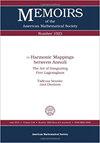On Singular Vortex Patches, I: Well-posedness Issues
IF 2
4区 数学
Q1 MATHEMATICS
引用次数: 28
Abstract
The purpose of this work is to discuss the well-posedness theory of singular vortex patches. Our main results are of two types: well-posedness and ill-posedness. On the well-posedness side, we show that globally m m -fold symmetric vortex patches with corners emanating from the origin are globally well-posed in natural regularity classes as long as m ≥ 3. m\geq 3. In this case, all of the angles involved solve a closed ODE system which dictates the global-in-time dynamics of the corners and only depends on the initial locations and sizes of the corners. Along the way we obtain a global well-posedness result for a class of symmetric patches with boundary singular at the origin, which includes logarithmic spirals. On the ill-posedness side, we show that any other type of corner singularity in a vortex patch cannot evolve continuously in time except possibly when all corners involved have precisely the angle π 2 \frac {\pi }{2} for all time. Even in the case of vortex patches with corners of angle π 2 \frac {\pi }{2} or with corners which are only locally m m -fold symmetric, we prove that they are generically ill-posed. We expect that in these cases of ill-posedness, the vortex patches actually cusp immediately in a self-similar way and we derive some asymptotic models which may be useful in giving a more precise description of the dynamics. In a companion work from 2020 on singular vortex patches, we discuss the long-time behavior of symmetric vortex patches with corners and use them to construct patches on R 2 \mathbb {R}^2 with interesting dynamical behavior such as cusping and spiral formation in infinite time.关于奇异涡旋补丁,I:姿势问题
本文的目的是讨论奇异涡斑的适定性理论。我们的主要结果有两种:适位性和不适位性。在适定性方面,我们证明了只要m≥3,具有角从原点发出的全局m -褶对称涡旋块在自然正则类中是全局适定的。M \geq在这种情况下,所有涉及的角度都解决了一个封闭的ODE系统,该系统规定了角的全局实时动态,并且仅取决于角的初始位置和大小。在此过程中,我们得到了一类在原点处边界奇异的对称补块的全局适定性结果,其中包括对数螺旋。在不适定性方面,我们表明涡旋斑块中任何其他类型的角奇点都不能随时间连续演化,除非所有涉及的角始终精确地为π 2 \frac{\pi 2}{。即使在角为π 2 }\frac{\pi 2}{或角仅局部为mm -折叠对称的涡旋斑块的情况下,我们也证明了它们是一般病态的。我们期望在这些不适定性的情况下,旋涡斑块实际上以自相似的方式立即出现尖峰,并且我们推导了一些渐近模型,这些模型可能有助于给出更精确的动力学描述。在2020年关于奇异涡旋斑块的合著作品中,我们讨论了带角的对称涡旋斑块的长时间行为,并利用它们在r2 }\mathbb R{^2上构造具有有趣动力学行为的斑块,如无限时间内的cusping和螺旋形成。}
本文章由计算机程序翻译,如有差异,请以英文原文为准。
求助全文
约1分钟内获得全文
求助全文
来源期刊
CiteScore
3.50
自引率
5.30%
发文量
39
审稿时长
>12 weeks
期刊介绍:
Memoirs of the American Mathematical Society is devoted to the publication of research in all areas of pure and applied mathematics. The Memoirs is designed particularly to publish long papers or groups of cognate papers in book form, and is under the supervision of the Editorial Committee of the AMS journal Transactions of the AMS. To be accepted by the editorial board, manuscripts must be correct, new, and significant. Further, they must be well written and of interest to a substantial number of mathematicians.

 求助内容:
求助内容: 应助结果提醒方式:
应助结果提醒方式:


